書籍・報告書 検索
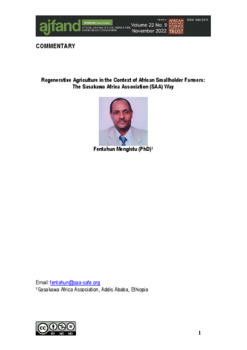
書籍・報告書 / その他
Regenerative Agriculture in the Context of African Smallholder Farmers: The Sasakawa Africa Association (SAA) Way
November.15.2022
SAAエチオピア事務所のフェンタフン・メンギスツ所長の「アフリカの小規模農家における環境再生型農業:SAA Way」と題した論説が、アフリカの農業・栄養・開発研究ジャーナル誌「African Journal of Food and Nutrition Development (AJFAND)」に掲載されました。
African Journal of Food and Nutrition Development (AJFAND) Volume 22 No. 9, November 2022
Commentary
"Regenerative Agriculture in the Context of African Smallholder Farmers: The Sasakawa Africa Association (SAA) Way"
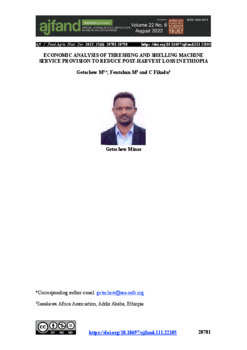
書籍・報告書 / その他
Economic analysis of threshing and shelling machine service provision to reduce post-harvest loss in Ethiopia
September.29.2022
エチオピアにおけるポストハーベスト・ロス削減の取り組み、脱穀・脱殻機サービスに関する経済分析が、アフリカの農業・栄養・開発研究ジャーナル誌「African Journal of Food and Nutrition Development (AJFAND)」に掲載されました。
African Journal of Food and Nutrition Development (AJFAND) Volume 22 No. 6.
"Economic analysis of threshing and shelling machine service provision to reduce post-harvest loss in Ethiopia"
(執筆:ササカワ・アフリカ財団 エチオピア事務所 Getachew Minas、Dr. Fentahun Mengistu、Fikadu Challa)
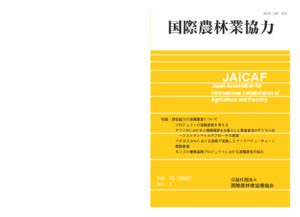
書籍・報告書 / その他
アフリカにおける小規模農家を対象とした農業普及のデジタル化 ―ラストテンマイルアプローチの提案
August.16.2022
(公社)国際農林業協働協会(JAICAF)が発行する国際農林業協力 【 Vol. 45 (2022), No. 1 通巻202 号】に当財団の取り組みが掲載されました。
特集:技術協力の遠隔運営について
『アフリカにおける小規模農家を対象とした農業普及のデジタル化 -ラストテンマイルアプローチの提案』
(執筆:田才諒哉)
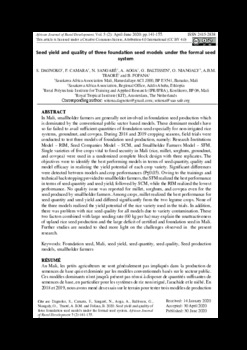
書籍・報告書 / その他
Seed yield and quality of three foundation seed models under the formal seed system
June.11.2021
ABSTRACT
In Mali, smallholder farmers are generally not involved in foundation
seed production which is dominated by the conventional public sector based models. These dominant models have so far failed to avail sufficient quantities of foundation seed especially for non-irrigated rice
systems, groundnut, and cowpea. During 2018 and 2019 cropping seasons, field trials were conducted to test three models of foundation seed production, namely: Research Institutions Model – RIM, Seed Companies Model – SCM, and Smallholder Farmers Model – SFM.
Single varieties of five crops vital to food security in Mali (rice, millet, sorghum, groundnut, and cowpea) were used in a randomized complete block design with three replicates. The objectives were to identify the best performing models in terms of seed quantity, quality and model efficacy in realizing the yield potential of each crop variety. Significant differences were detected between models and crop performances (P≤0.05). Owing to the trainings and technical backstopping provided to smallholder farmers, the SFM realized the best performance in terms of seed quantity and seed yield; followed by SCM, while the RIM realized the lowest performance. No quality issue was reported for millet, sorghum, and cowpea even for the seed produced by smallholder farmers. Among crops, millet realized the best performance for seed quantity and seed yield and differed significantly from the two legume crops. None of the three models realized the yield potential of the rice variety used in the trials. In addition, there was problem with rice seed quality for all models due to variety contamination. These two factors combined with large seeding rate (60 kg per ha) may explain the unattractiveness of upland rice seed production and the large deficit of certified and foundation seed in Mali. Further studies are needed to shed more light on the challenges observed in the present research.
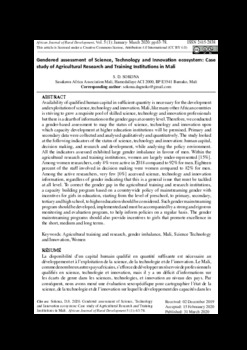
書籍・報告書 / その他
Gendered assessment of Science, Technology and Innovation ecosystem Case study of Agricultural Research and Training Institutions in Mali
June.11.2021
ABSTRACT
Availability of qualified human capital in sufficient quantity is necessary for the development
and exploitation of science, technology and innovation. Mali, like many other African countries
is striving to grow a requisite pool of skilled science, technology and innovation professionals
but there is a dearth of information on the gender gaps at country level. Therefore, we conducted a gender-based assessment to map the status of science, technology and innovation upon which capacity development at higher education institutions will be premised. Primary and secondary data were collected and analysed qualitatively and quantitatively. The study looked at the following indicators of the status of science, technology and innovation: human capital, decision making, and research and development, while analysing the policy environment. All the indicators assessed exhibited large gender imbalance in favour of men. Within the agricultural research and training institutions, women are largely under-represented [15%]. Among women researchers, only 8% were active in 2018 compared to 92% for men. Eighteen percent of the staff involved in decision making were women compared to 82% for men. Among the active researchers, very few [6%] accessed science, technology and innovation information, regardless of gender indicating that this is a general issue that must be tackled at all level. To correct the gender gap in the agricultural training and research institutions, a capacity building program based on a countrywide policy of mainstreaming gender with incentives for girls in education, starting from the level of preschool, to primary, secondary, tertiary and high school, to higher education should be considered. Such gender mainstreaming program should be developed, implemented and must be accompanied by a strong and rigorous monitoring and evaluation program, to help inform policies on a regular basis. The gender mainstreaming programs should also provide incentives to girls that promote excellence in the short, medium and long terms.



